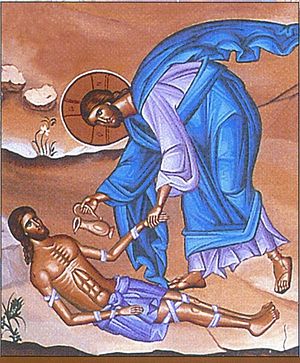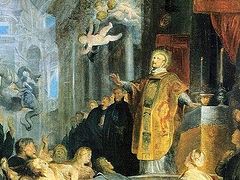
Love God as he commanded you to love Him, and not as self-deluded daydreamers think they love Him.
Do not fabricate raptures for yourself, do not excite your nerves, do not inflame yourself with a material fire, with the fire of your blood. The sacrifice pleasing to God is humility of heart, contrition of spirit. With wrath does God turn away from sacrifices offered with self-confident presumption, with a proud opinion of oneself, though the sacrifice be a whole burnt offering.
Pride excites the nerves, heats the blood, arouses daydreaming, enlivens the life of the fall; humility calms the nerves, subdues the motion of the blood, eliminates daydreaming, mortifies falls, enlivens the life in Jesus Christ.
Obedience before the Lord is greater than good sacrifice, and submission than the fat of rams said the Prophet to the Israelite king who had dared to offer to God a wrong sacrifice (1 Samuel 15:22). When you wish to offer to God the sacrifice of love, do not offer it self-willfully, from a thoughtless impulse; offer it with humility, in that time and that place which the Lord commanded
"The spiritual place on which spiritual sacrifices are commanded to be offered alone is humility" (Saying of St. Pimen the Great from the Alphabetical Patericon).
The Lord marked the one who loves and the one who does not love by true and exact signs: If a man love Me, he will keep My word. He that loveth Me not keepeth not My sayings (John 14:23-24).
Do you wish to learn the love of God? Shun every deed, word, thought, and feeling forbidden by the Gospel. By your enmity towards sin which is so hated by All-Holy God, you will show and prove your love for God. When due to weakness it happens that you fall into transgressions, heal them at once by repentance. But it is better to strive not to allow yourself even these transgressions, by strict watchfulness over yourself.
Do you wish to learn the love of God? Assiduously learn the commandments of the Lord in the Gospel, and strive to fulfill them in very deed. Strive to turn the Gospel virtues into habits, into your qualities. For a person who loves, it is natural to fulfill the will of the beloved with exactness.
I have loved Thy commandments more than gold and topaz: therefore, I directed myself toward all Thy commandments; every path of unrighteousness have I hated says the Prophet (Ps. 118:127, 128, LXX). Such conduct is indispensable for maintaining fidelity to God. Fidelity is the unalterable condition of love. Without this condition, love is dissolved.
By the constant shunning of evil and fulfilling of the Gospel virtues—which comprises the whole Gospel moral teaching—we attain the love of God. And by this same means do we abide in the love of God: If ye keep My commandments, ye shall abide in My love said the Savior (John 15:10).
The perfection of love consists in union with God; advancing in love is joined with inexpressible spiritual consolation, delight, and enlightenment. But in the beginning of the struggle, the disciple of love must undergo a violent warfare with himself, with his own deeply damaged nature: evil, which through the fall became innate to our nature, has become for it a law, warring and revolting against the Law of God, against the law of holy love.

Love of God is entirely spiritual: that which is born of the Spirit is spirit (John 3:6). That which is born of the flesh is flesh (John 3:6): carnal love, as something born of flesh and blood, has material, corrupt properties. It is inconstant, changeable: its fire is completely dependent on matter.
Hearing from Scripture that our God is a fire (Heb.12:29), that love is a fire, and feeling in yourself a fire of natural love, do not think that this is one and the same fire. No! These fires are at enmity with one another and are swallowed up by one another (cf. Ladder of Divine Ascent, steps 3 and 15). Let us serve in a manner well-pleasing to God, with reverence and fear; for our God is a consuming fire (Heb. 12:28-29).
Natural love, i.e. fallen love, heats a person's blood, excites his nerves, and arouses daydreaming; holy love cools the blood, calms both soul and body, draws the inner man towards prayerful silence, and immerses him in rapture through humility and spiritual delight. Many ascetics, having taken natural love for Divine love, excited their blood, and excited their daydreams also. The condition of excitement passed very easily into a condition of frenzy. Many took those who were in a state of excitement and frenzy for persons filled with grace and holiness, while they were actually unfortunate victims of self-delusion.
There were many such ascetics in the Western Church from the time it fell into heresy, in which Divine properties are blasphemously ascribed to a man, and veneration which is due and fitting to God alone is given to a man. Many of these ascetics wrote books from their excited condition in which frenzied self-delusion seemed to them to be Divine love, in which their disordered imagination painted for them a multitude of visions which flattered their self-love and pride.
Son of the Eastern Church! Shun the reading of such books, avoid following the precepts of those who are self-deluded. Guided by the Gospel and the holy fathers of the true Church, ascend with humility to the spiritual height of Divine love by the means of fulfilling Christ's commandments in deed.
Know firmly that love for God is the highest gift of the Holy Spirit, and a person can only prepare himself, through purity and humility, for the receiving of this great gift, through which mind and heart and body are changed.
In vain is the labor, fruitless is it and harmful, when we seek to discover in ourselves high spiritual gifts prematurely: merciful God gives them in His own time, to the constant, patient, humble fulfillers of the Gospel commandments. Amen.




